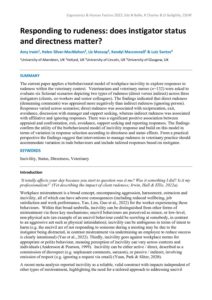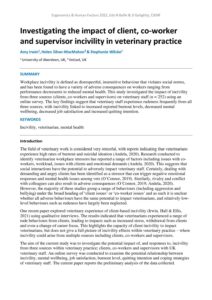Veterinary
Responding to rudeness: does instigator status and directness matter?
| Document | Author Amy Irwin, Helen Silver-MacMahon, Liz Mossop, Kendyl Macconnell & Luiz Santos |
| Abstract The current paper applies a biobehavioural model of workplace incivility to explore responses to rudeness within the veterinary context. Veterinarians and veterinary nurses (n=132) were asked to evaluate six fictional scenarios depicting two types of rudeness (direct versus indirect) across three instigators (clients, co-workers and senior colleagues). The findings indicated that direct rudeness (demeaning comments) was appraised more negatively than indirect rudeness (ignoring person). Responses varied across scenarios; direct rudeness was associated with reciprocation, exit, avoidance, discussion with manager and support seeking, whereas indirect rudeness was associated with affiliative and ignoring responses. There was a significant positive association between appraisal and confrontation, exit, avoidance, support seeking and reporting responses. The findings confirm the utility of the biobehavioural model of incivility response and build on this model in terms of variation in response selection according to directness and status effects. From a practical perspective the findings suggest that interventions to manage rudeness in veterinary practice should accommodate variation in rude behaviours and include tailored responses based on instigator. |
Investigating the impact of client, co-worker and supervisor incivility in veterinary practice
| Document | Author Amy Irwin, Helen Silver-MacMahon & Stephanie Wilcke |
| Abstract Workplace incivility is defined as disrespectful, insensitive behaviour that violates social norms, and has been found to have a variety of adverse consequences on workers ranging from performance decrements to reduced mental health. This study investigated the impact of incivility from three sources (clients, co-workers and supervisors) on veterinary staff (n = 252) using an online survey. The key findings suggest that veterinary staff experience rudeness frequently from all three sources, with incivility linked to increased reported burnout levels, decreased mental wellbeing, decreased job satisfaction and increased quitting intention. |


